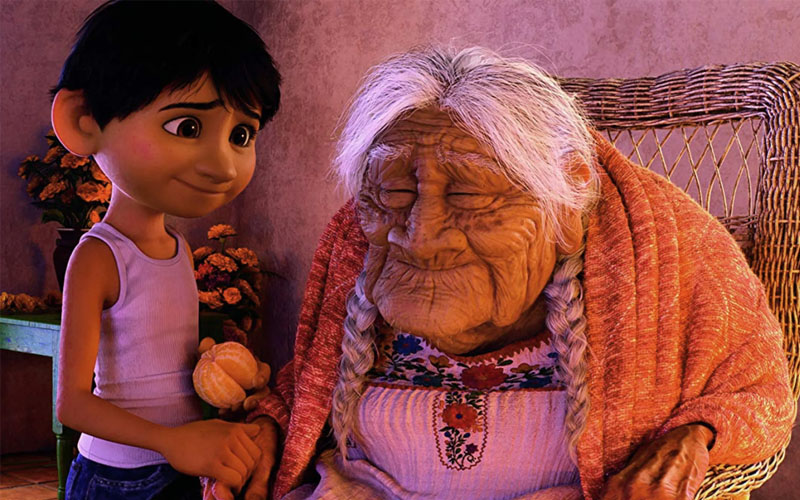As a Salvadoran/Bolivian first-gen Latina in the U.S, I learned so much about Día de Los Muertos from the Disney movie Coco. My family did not celebrate the holiday growing up. So, with the anniversary of my grandmother’s death and Día de Los Muertos, I wanted to share what I have learned. Not only from the folkloric/holiday perspective but also as a portrait of Latin American family structures and mental health:
1. Beauty in grief: Our culture, and many others, can tend to silence tough topics or deny them a platform of expression. According to the author and psychiatrist Elizabeth Kubler-Ross, there are five stages of grief–denial, anger, bargaining, depression, and acceptance. Knowing the names of each stage and emotion can even help us move through them. The Día de los Muertos celebration shows there can be beauty in grief and even a healthy sadness that walks hand-in-hand with nostalgic reverence for our loved ones.
When my Abuelita passed away, it brought our family closer together. I remember how grateful I felt for her presence in my life. My cousins and I laughed about old memories and her famous dichos like, “por su gusto se muere” which she would say to me, with a supportive glance. It generally came when I wanted to do something that my parents deemed ridiculous like going kayaking or camping. It was her way of saying, “your passions are worth dying for.”
I think about the closing scene, with Mamá Coco passing away, and the beauty of her family surrounding her. The beautiful closure as she was reminded of her papá on her way to meet him again.
2. Culture and family shape the way we view the world: This movie presents a very accurate picture of how our cultural and family background has a bigger impact on our personalities and feelings than we think. Miguel struggles against a family that has banned music and singing, feeling suppressed and isolated. By going into the world of the dead, he discovers the origin of such behavior in a family trauma that happened generations before him and became accepted by everyone due to respect for great-grandma Imelda.
To me, this is a great example of how questioning or challenging certain cultural assumptions is very important to emphasize our individuality and right to live how we want. And, as a mother now, why the value of examining generational trauma is so important for my kids. We have a choice in what we decide to carry on to the next generation. Our ancestors have given us so much love, but they were all (and we are too) limited to a cultural context. It’s on us now to pause and think about what traditions we want to carry on and what stories or patterns we want to stop repeating.
3. We all need a safe place to explore our feelings: At times though, the grief was overwhelming, and I didn’t want to be a burden to those already in pain. It’s something I struggle with, knowing when to and when not to share my feelings. And, like Miguel, I have learned through trial and error that some dreams and thoughts are best kept to myself while others can be shared.
For his family, playing the guitar was a taboo, almost a sin, but it was his passion, so he felt sad because he was ‘betraying’ his family. In my case, when processing the grief, I didn’t want to be told “it’s OK, everything is fine”: I wanted to be angry and sad in a safe place. Sometimes our families, despite their best intentions, don’t want us to feel negative emotions and create toxic rules and limitations that are meant to protect us but can keep our emotions suffocated. So, we must find our safe places, and sometimes that means looking outside the immediate family.
4. Support outside our known circles: Last year, Crisis Text Line launched their emotional support service in Spanish. For me, it felt like a safe, empathetic friend or cousin I could text right before bed to help calm my racing thoughts without the guilt of bothering my family too late at night, or feeling needy. Within minutes, Crisis Text Line texted me back. I went from feeling alone with the pain to feeling comforted and supported from a simple text of AYUDA to 741741. I loved how I didn’t have to talk to anyone, I could share my feelings through text, and it was confidential with 24/7 access.
The crisis counselor provided me with a variety of resources on how to deal with my grief and loneliness such as remembering to connect with my friends and family (when I was ready), interacting more with people I work with daily, building new friendships and finding a community connection like joining a new workout group or art class.
###
Are you missing someone today? Are you feeling lonely? Or perhaps you’re visiting one of the stages of grief but too shy to share and open up? Maybe it’s not the death of a parent, maybe it’s a break-up, or being far away from your family: grief has many faces. For immediate help, text AYUDA to 741-741, and trained volunteer Crisis Counselors will be there for you; you’re not alone!



Recent Comments